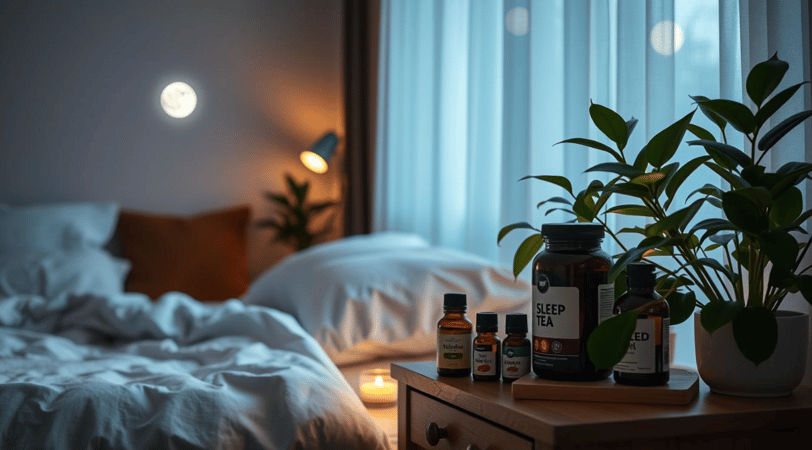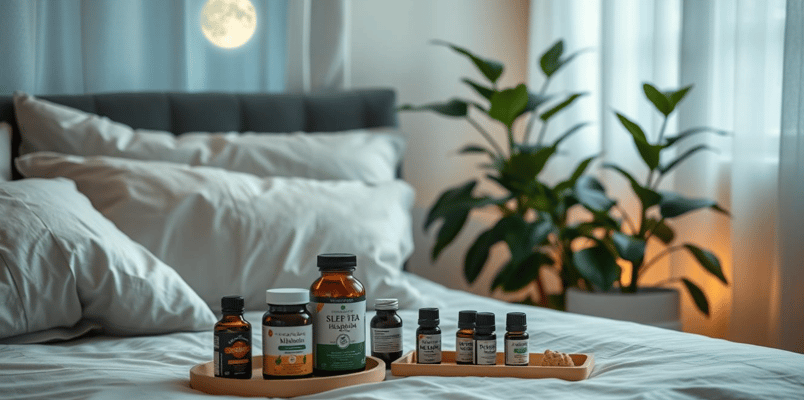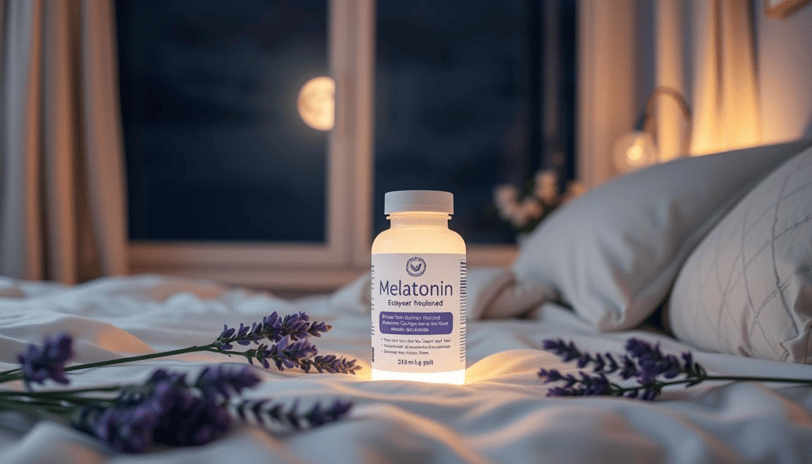Top Rated Natural Sleep Aids for Women in Perimenopause
Having trouble sleeping during perimenopause? Review our expert-tested list of the best sleep aids for women 40+. From natural supplements to hormone-supporting solutions, find relief from perimenopausal insomnia, hot flashes, and night sweats. Trusted remedies to improve your sleep quality during menopause transition.
40+WOMEN'S HEALTHSLEEPBODYSELF CAREWELLNESS
The Better LIfe Team
11/5/20249 min read
Did you know nearly two-thirds of American adults have tried melatonin for sleep? If you're a woman going through perimenopause, you're not alone in your sleep struggles. There are natural sleep aids that can help you get better rest.
Dealing with hormonal changes, night sweats, or stress can be tough. The right sleep supplements can help you sleep better. In this guide, we'll look at the best natural sleep remedies for women in perimenopause. We'll give you the info you need to choose the best sleep health options.


Key Takeaways
Natural sleep aids can be a safe and effective solution for managing sleep disturbances during perimenopause
Popular natural sleep supplements include melatonin, magnesium, L-Theanine, glycine, and valerian root
These supplements can help you fall asleep faster, stay asleep longer, and improve overall sleep quality
It's important to understand the optimal dosage, timing, and potential side effects of each natural sleep aid
Incorporating lifestyle changes and alternative therapies can also support better sleep during the menopausal transition
Understanding Sleep Challenges During Perimenopause
Perimenopause brings unique sleep challenges. Hormonal changes disrupt sleep patterns for many women. Knowing common sleep issues and their causes helps you cope better.
Common Sleep Disruption Patterns
Women in perimenopause often struggle to fall asleep. They wake up a lot at night and wake up early. These problems make you tired and cranky during the day.
Hormonal Impact on Sleep Quality
Hormonal shifts, especially lower estrogen, affect sleep. These changes mess with body temperature and circadian rhythms. This leads to poor sleep quality.
Effects of Night Sweats on Sleep
Night sweats are common in perimenopause. They disrupt sleep with sudden awakenings and temperature changes. This makes it hard to sleep well and feel tired during the day.
It's important to tackle menopausal insomnia and understand hormonal effects on sleep. Talking to your doctor about these issues can lead to finding solutions. This might include hormone therapy or other proven treatments.

"Cognitive behavioural therapy has shown effectiveness in improving sleep for women with menopausal symptoms."
Natural Sleep Aids for Perimenopause
Perimenopause brings hormonal changes that can disrupt sleep. Natural sleep aids offer relief and better sleep quality. These include herbal supplements and nutrient-rich solutions.
Melatonin is a hormone that helps regulate sleep. As we age, melatonin levels drop, causing insomnia. Taking melatonin supplements can improve sleep during menopause.
Magnesium is another natural aid. It helps regulate the body's sleep cycle and improves sleep in postmenopausal women. CBD also enhances sleep, reduces disturbances, and shortens the time it takes to fall asleep.
Herbal remedies like chamomile, lemon balm, and valerian root help with perimenopause sleep issues. They can reduce hot flashes, night sweats, and anxiety that disrupt sleep.
Organic Chamomile tea may reduce hot flashes and night sweats.
Lemon balm extract improves sleep in postmenopausal women.
A mix of lemon balm and valerian supplements helps 36% of menopausal women with sleep problems.
Organic Tart CherryExtract, and passionflower also improve sleep quality and duration in perimenopause. They offer a natural way to tackle sleep challenges during this phase of life.


"Menopause-related insomnia can persist for several weeks to several months without proper treatment."
When looking into natural sleep aids for perimenopause, talk to your healthcare provider. They can ensure safety and effectiveness, especially if you're on medications. With the right natural solutions, you can enjoy better sleep and well-being during this time.
Melatonin: The Sleep Hormone Solution
As a woman going through perimenopause, you might find it hard to sleep well. Melatonin, the body's natural sleep hormone, can really help. It's a key player in getting the rest you need.
Optimal Dosage Guidelines
The right amount of melatonin for women in perimenopause is between 0.5 to 5 milligrams. Start with the smallest dose and slowly increase it if needed. Most doctors say to take it 30 minutes to an hour before bed for best results.
Timing and Administration
Being consistent with melatonin is crucial. Take it at the same time every night for the best results. It should be part of a regular sleep routine. Always talk to your doctor to find the best time and amount for you.
Potential Side Effects
Melatonin is usually safe, but it can have side effects. Some people might feel sleepy during the day, have headaches, or feel dizzy. Always tell your doctor about any health issues or medicines you're taking before starting melatonin.


Keep in mind, melatonin works differently for everyone. It's important to work with your doctor to find the right dose and timing for you. Adding melatonin to your sleep routine can help you get the restful sleep you need during this important time.
Herbal Supplements and Traditional Remedies
Exploring herbal sleep supplements and traditional remedies can be a big help for women in perimenopause. These natural options are often kinder than prescription meds, with fewer side effects.
Black cohosh is a well-known herbal sleep aid. It helps with hot flashes and night sweats, common sleep disruptors during this time. Soy isoflavones have also been proven to lessen hot flashes and night sweats, which can improve sleep.
Black cohosh has been shown to be effective in treating menopausal symptoms, with over 8,000 women participating in studies on its efficacy.
Soy isoflavones have been found more effective than a placebo in reducing hot flashes and vaginal dryness in menopausal women.
Calming herbs like chamomile and lemon balm are also worth trying. Chamomile tea can help you relax and sleep better. Lemon balm is known for its calming effects. Montmorency cherry, full of melatonin, is another natural sleep aid for perimenopausal women.
"Herbal supplements and traditional remedies can offer a gentler approach to managing sleep challenges during perimenopause, with the potential for fewer side effects compared to prescription sleep medications."
If you're looking into herbal sleep supplements or natural remedies for perimenopause, talk to your healthcare provider first. They can help you find the best natural solutions. With the right choices, you can get better sleep and ease through this transition.
Sleep Aids for Perimenopause: Over-the-Counter Options
Women going through perimenopause often face sleep problems. Over-the-counter (OTC) sleep aids can offer quick relief. These affordable options might help with insomnia and other sleep issues during this time. But, it's important to think about safety and side effects before using them.
Safety Considerations
OTC sleep aids usually have antihistamines and pain meds. They can make you sleepy but might also make you feel groggy or dizzy. Always stick to the recommended dose and don't use them for too long. Long-term use can make them less effective and lead to dependence.
Drug Interactions
Be careful when using OTC sleep aids because they can interact with other medicines or supplements. These interactions might cause unwanted side effects. Always talk to your doctor before starting any new sleep aid, especially if you're on other medications.
Duration of Use
OTC sleep aids are meant for short-term use. Using them for too long can make them less effective. If you're still having sleep problems after a few weeks, see a doctor. They can help find other ways to solve your sleep issues.
While OTC sleep aids can help in the short term, they're not a long-term fix for perimenopausal sleep issues. Good sleep habits, natural remedies, and addressing health concerns are key for lasting sleep during this time.
Lifestyle Changes to Support Better Sleep
During the transition to menopause, known as perimenopause, many women face sleep challenges. Hormonal fluctuations can make it hard to sleep well. But, simple lifestyle changes can help a lot.
Start by setting a regular sleep schedule. Also, create a calming bedtime routine. And make sure your bedroom is cool, dark, and quiet.
Regular exercise, especially during the day, can help you sleep better at night. But, avoid caffeine, alcohol, and heavy meals before bed. They can mess with your sleep.
Stress can also affect your sleep. Try meditation or yoga to relax and sleep better.
Establish a consistent sleep schedule by going to bed and waking up at the same time each day, even on weekends.
Create a relaxing bedtime routine, such as taking a warm bath, reading a book, or practicing gentle stretching exercises.
Ensure your sleeping environment is cool, dark, and quiet to support better sleep.
Engage in regular physical activity during the day, but avoid intense workouts close to bedtime.
Limit caffeine, alcohol, and heavy meals in the hours leading up to your bedtime.
Incorporate stress-reducing practices like meditation, deep breathing, or gentle yoga into your daily routine.
By making these lifestyle changes, you can help support better sleep during the perimenopausal transition. This can improve your overall well-being. Remember, being consistent and patient is important when trying these sleep-promoting strategies.
Alternative Therapies and Relaxation Techniques
If you're having trouble sleeping during perimenopause, there are helpful alternatives. These can make a big difference in your sleep and overall health. Adding these practices to your daily life can lead to better rest.
Meditation and Mindfulness Practices
Meditation and mindfulness can ease stress and anxiety. These are big reasons for sleep trouble in perimenopause. Practices like guided meditation and body scans help calm your mind and prepare you for sleep.
Breathing Exercises
Breathing exercises, like deep breathing, can relax you and get you ready for sleep. They slow down your breathing and calm your body. This helps your body relax and prepares it for rest.
Sleep Hygiene Tips
Good sleep habits are key for perimenopausal sleep issues. Keep a regular sleep schedule and make your sleep space comfy. Avoid screens before bed. These habits help you sleep better.
FAQ
What are natural sleep aids for women in perimenopause?
Natural sleep aids are supplements that help you fall asleep or stay asleep. They are often made from plants, vitamins, or body substances. People like them because they have fewer side effects than prescription drugs.
Popular ones include melatonin, magnesium, L-Theanine, glycine, and valerian root.
What are the common sleep disruption patterns during perimenopause?
Perimenopause can make it hard to sleep. You might find it hard to fall asleep, wake up a lot at night, or wake up early. Hormonal changes, like lower estrogen, can mess with your sleep.
Night sweats can also wake you up and make you uncomfortable.
How can natural sleep aids help manage perimenopausal sleep issues?
Natural sleep aids can help with perimenopausal sleep problems. Melatonin helps regulate your sleep cycle. Magnesium can improve sleep, especially for older adults.
L-Theanine, found in tea, can reduce stress and help you relax. Glycine may improve sleep and reduce daytime tiredness. Valerian root can help you fall asleep and sleep better when taken before bed.
What is the optimal dosage and timing for using melatonin during perimenopause?
Melatonin is a popular choice for perimenopausal women. The best dose is 0.5 to 5 mg, taken 30 minutes to an hour before bed. It's important to take it at the same time every night.
While safe for most, it can cause drowsiness, headaches, or dizziness. Always talk to a doctor before starting melatonin, especially if you're on other medications.
What other herbal supplements and traditional remedies can help with perimenopausal sleep issues?
Herbal supplements and traditional remedies can help with sleep. Black cohosh can help with hot flashes and night sweats. Soy isoflavones have been shown to reduce these symptoms too.
Chamomile tea is calming and may improve sleep. Lemon balm and Montmorency cherry can also help relax and improve sleep. These options often have fewer side effects than prescription drugs.
What are the safety considerations for using over-the-counter sleep aids during perimenopause?
Over-the-counter sleep aids can help with short-term sleep problems. But, they can cause side effects like drowsiness or dizziness. Be careful about drug interactions, especially with other medications or supplements.
Don't use them for too long, as they can lead to dependence or reduced effectiveness. Always check with a healthcare provider before starting any new sleep aid.
What lifestyle changes can improve sleep quality during perimenopause?
Lifestyle changes can greatly improve sleep during perimenopause. Stick to a regular sleep schedule and create a relaxing bedtime routine. Keep your bedroom cool and dark.
Exercise during the day can help you sleep better at night. Avoid caffeine, alcohol, and heavy meals before bed. Stress management, like meditation or yoga, can also help.
What alternative therapies and relaxation techniques can help with perimenopausal sleep issues?
Alternative therapies and relaxation techniques can help with sleep. Meditation and mindfulness can reduce stress and anxiety, leading to better sleep. Breathing exercises, like deep breathing or the 4-7-8 technique, can relax you and prepare you for sleep.
Good sleep hygiene includes a consistent sleep schedule, a comfortable sleep environment, and avoiding screens before bed. Regular practice of these techniques can improve sleep quality during perimenopause.
Source Links
Natural Sleep Aids: Which Are the Most Effective? - https://www.sleepfoundation.org/sleep-aids/natural-sleep-aids
The best sleep aids recommended by experts: from blue light-blockers to apps to help you nap - https://www.theguardian.com/thefilter/2024/oct/22/the-best-sleep-aids-recommended-by-experts-from-blue-light-blockers-to-apps-to-help-you-nap
The Supplements You Should Try If You’re Going Through Menopause - https://www.vogue.com/article/menopause-supplements-perimenopause-symptoms
Sleep Problems and Menopause: What Can I Do? - https://www.nia.nih.gov/health/menopause/sleep-problems-and-menopause-what-can-i-do
How Does Menopause Affect My Sleep? - https://www.hopkinsmedicine.org/health/wellness-and-prevention/how-does-menopause-affect-my-sleep
Natural Sleep Aids for Menopause - https://menomademodern.com/menoapuse-and-insomnia/
6 Natural Remedies for Menopause Sleep Problems - https://thebettermenopause.com/blogs/the-better-gut-community/herbal-remedies-menopause-sleep-problems-insomnia
Menopause and Melatonin - https://healthcare.utah.edu/the-scope/health-library/all/2021/05/menopause-and-melatonin
Melatonin Information | Mount Sinai - https://www.mountsinai.org/health-library/supplement/melatonin
7 Natural Supplements That Can Help With Sleep and Menopause - https://www.psychologytoday.com/intl/blog/sleep-newzzz/201808/7-natural-supplements-can-help-sleep-and-menopause
10 Herbs and Supplements for Menopause - https://www.healthline.com/nutrition/menopause-herbs
Meds to Help You Sleep Better During Menopause - https://www.verywellhealth.com/insomnia-medications-for-menopause-2322786
Best Sleep Supplements for Menopause - https://sleepdoctor.com/women/best-sleep-supplements-for-menopause/
Sleep Supplements for Perimenopause - https://drannagarrett.com/sleep-supplements-for-perimenopause/
Get A Better Night’s Sleep During Menopause - https://www.piedmont.org/living-real-change/get-a-better-nights-sleep-during-menopause
Diet and Lifestyle Changes to Improve Menopause Sleep Problems | Positive Pause - https://www.positivepause.co.uk/menopause-blog/menopause-sleep-problems-lifestyle-diet-and-nutrition-changes-to-help
Natural remedies for menopause - https://www.medicalnewstoday.com/articles/natural-remedies-for-menopause
Learning to Relax During Menopause - https://www.webmd.com/menopause/learning-relax-during-menopause
Complementary and Alternative Medicine for Menopause - https://pmc.ncbi.nlm.nih.gov/articles/PMC6419242/
Disclaimer: This blog contains affiliate links. We are not healthcare professionals. Please consult a doctor before taking any supplements.